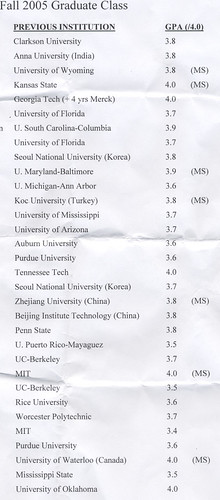What it takes to get in...
Perhaps A*star is right. One does need that 3.8 GPA to get in. It's quite sad that your application gets reduced to some arbitrary numbers like your GPA and GRE scores. But what to do when the Admissions committee gets swamped with applications every year?
Average GPA: 3.75
Official admission literature from the schools will always say that many factors are given consideration, and this is really true. In the end, the whole picture either looks like a fit with the particular department, or it doesn’t. On the other hand, certain weak spots are at once disqualifying. A popular program sees and expects very high undergraduate GPAs (still better graduate GPAs if applicable) at well-known institutions (ideally 3.7 / 4.0 or better, unless you come from a non-U.S. school or system that is understood to have tougher standards). It also expects a quantitative GRE score above 750 (800s are not out of the ordinary) and a decent analytical score. The verbal section is much less important, but a score below 500 looks off-putting, especially on an international application. Anything short of these benchmarks lands your application on the reject pile, unless you have some very intriguing other credentials (and usually inspite of it). - Applying for Admission
More: Academic Pedigrees, Grad School Admissions Crap
Recruitment weekend for accepted prospective grad students is round the corner. I wonder the quality of this incoming class.





6 comments:
3.8
crazy hor?
I think the issue is whether 3.8 is a guideline or a requirement. I know a number of people who were accepted by schools such as Harvard and MIT with a 3.5-3.6. Their main selling point is their research experience - the types who publish and have presented at major conferences - as undergrads. However, according to some fools these students aren't suited for research :-(
I failed to point out that the friends I had in mind when typing the previous comment are not Singaporean and have no intention of applying for Singapore scholarships. What I meant is: what if they were Singaporeans who intended to apply for Singapore scholarships?
Aside, I don't get why sponsors of graduate scholarships need to know the O or A Level results of their applicants. One of my friends who held a US govt fellowship had high school grades closer to 0.0 than 2.0/4.0.
so in your opinion,
all of them lackeys will spend all their time trying to get a 4.0 by taking easy courses and neglecting doing research and not publishing and not presenting;
and they will still get their brand name graduate schools because they're independently funded and schools are dying to get these bright young stars?
such a clean and pure judgement.
i couldn't agree more.
Amongst the non-trivial number of people I know who are applying to grad schools in more than one science discipline, a few things I noticed:
1. The two most successful in their applications are 5th year seniors. Both were accepted by Harvard and MIT, amongst other universities of similar cachet.
2. The same two have GPAs below 3.8.
3. The same two are actively involved in research, a factor which strongly contributed to them being 5th year seniors.
4. One of the two was denied admission by two of his "safety" schools. One of the schools was "concerned about his GRE quant score".
5. Two students who by GPA would be considered amongst the top 5 in their resp depts, one of whom is already the holder of a prestigious graduate fellowship, the other is actively involved in research too, had less luck with the brand-name private universities. They did get stellar offers elsewhere.
What do you conclude?
The Americans call it crapshoot.
Post a Comment